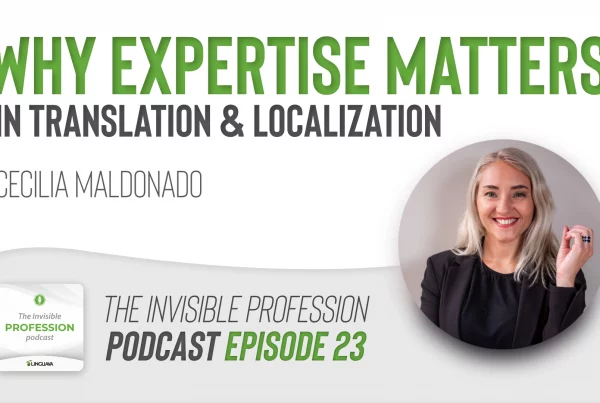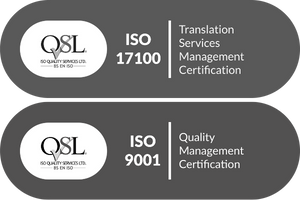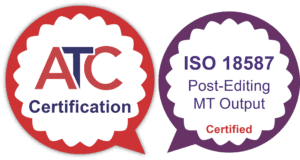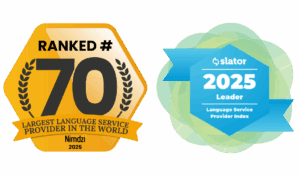Imagine your first interpreter experience being for the president of Venezuela, Hugo Chavez. That is exactly how Melissa’s interpreter career began many years ago. Since then she has gained invaluable opportunities interpreting for the United Nations Office and over 40 international organizations in Geneva, Switzerland. Listen to this episode to hear her story and her take on what makes an interpreter great.
We will discuss the significance of having the right mindset and focus when working as an interpreter, especially when it comes to politics. We’ll also go over some tips on how interpreters can best handle difficult situations that might come up, like thinking on their feet and always being prepared with snacks and water. And on the other side of the conversation, we’ll share tips with clients on how they can work more effectively with interpreters, such as connecting with them before an event.
Listen to Linguava’s podcast on all your favorite platforms here.
Connect with us on your favorite social site:
LinkedIn | Facebook | Instagram
At Linguava, we are dedicated to reducing communication barriers and providing equity to all members of our community through language access services.
If you are interested in learning more about incorporating language access into your organization or would like to book a training session, contact us today.
Transcript – The Invisible Profession Podcast Ep. 010
David: Welcome everyone to episode number 10, a big episode. Number 10, super excited because you are all in for a big treat today. It is a pleasure to have Melissa Yitani on the show with us today.
Welcome to the Linguava podcast, invisible profession, where we give you tools, tips, and resources and medical interpretation and translation that helped bring to life.
our industry. And ultimately help improve health outcomes for the Limited English Proficient communities,
Melissa, for those of you who don’t yet know her, she is someone who is a polyglot. She speaks five languages, English, Spanish, French, Dutch, and. Papiamento. Am I saying that right? And she is someone who is a simultaneous interpreter. She’s experienced as a translator. She has worked with the Venezuelan government interpreted for several presidents there.
She’s also interpreted for the United Nations and over 40 international organizations in Geneva, Switzerland, which is where she currently lives in Geneva. And today she’s going to be sharing a little bit about her interpreter story, which is a extremely unique, her story as a linguist and how she got started as a linguist and everything just sort of started to fall in place for her.
And she’s going to also talk about what makes a linguist go from good to great. What are some of the differences that separate the two? And we’re going to get to learn a lot from her experiences that are, it’s very rare to come across a linguist that has the amount of experience that Melissa has.
So without further ado, Melissa, welcome to the podcast.
[00:01:54] Melissa: Thank you, David. Well, Your first question that you start it off saying like how I started off, right. Well, I’ll take you back to 2006 to Venezuela. I had just arrived to Venezuela. I moved there two months before my first interpreting experience.
And. I got contacted because the Malaysian embassy, they need it and they needed interpreters. So they wanted to do some tests for interpreters and to see if they could accompany the visit of their prime minister, that was going to be visiting Venezuela in December of that year. So, they sat me in a booth and they started saying, okay, interpret. I had studied interpretation in LA, but I stopped studying and I went to Venezuela to restart the career in translation and interpreting.
So in Venezuela, I still hadn’t started. So when this happened. So the moment I do the whole thing and they say, okay, you’re going to be interpreting for the journalists that accompany the prime minister. And I said, okay, that’s perfect. Then they said, we’re still going to interview other interpreters and we’re going to do some tests for them as well.
And we’ll let you know, at the end. They called me two days before. And they said, listen you’re the one that did better. So you’re not going to interpret the journalists anymore. You’re going to be interpreting the minister of energy and oil from Malaysia. This is two days before he arrived to the country.
[00:03:29] David: Wow.
[00:03:29] Melissa: So I had no idea of energy nor oil. I don’t think I slept for those two days. I studied so much just to make sure that I would have everything down. Just understand the process because in my case, I need to understand what I’m interpreting. I can’t really interpret by learning things by heart. So when I get there to the airport to meet the minister, he tells me, oh, I tell them I’m going to be your interpreter.
Nice to meet you. And he says, oh, but you’re mistaken. I’m no longer the minister of energy and oil. I said, okay. Wow, great. Now my new post is minister of the prime minister’s department. May I think my face showed that I had no idea what that meant. And he said, it’s basically like a vice president. So there I started freaking out originally, that was the, I was like, okay, so this guy is going to talk about every single thing that can come up to his head.
So he said, and our first meeting is with the president of Venezuela. Okay.
[00:04:49] David: So first meeting. So this is like your first official job, pretty much interpretation job.
[00:04:56] Melissa: My first official job, which I was not really repaired for.
[00:05:03] David: So you go in there and you have the president of Venezuela. You have this. What was it? The prime minister to the prime minister? What was it?
[00:05:13] Melissa: Yeah, the minister of the prime minister’s department. That’s the name of it.
[00:05:17] David: Like a vice-president. Okay. Yeah. And you’re interpreting between the two?
[00:05:22] Melissa: Yes, consecutive. Okay. So he’s just says, oh, how many times have you interpreted – in the car, he tells me how many times have you interpreted the president before?
And I said, This is my first time interpreting the president. And I said, okay, let’s just leave it at that. Yes. I’m not going to say interpreting at this level. So I get there. And the first experience was shocking because you’re basically, I think there’s two types of interpreters you have, there are normal and traverse, and then you have.
Diplomatic interpreters in a way, which is when you have to interpret for high level politics or diplomacy, because there was, I think there’s a different nuance to that, which I didn’t know at the time I’ve come to learn with experience, which is you basically have to sugar coat, what they say more than you would in another.
In another context of interpretation.
[00:06:33] David: Now when you say sugarcoat, you, meaning, are you saying, like summarize, what are you meaning by a sugarcoat? Or not saying everything.
[00:06:42] Melissa: Not say like, if they say something that’s too rude, you have to make it sound nice. Not changing the meaning, but just make it sound nicer.
I think there was a huge No, I think it was a few years ago with the Iranian interpreter. That changed what he said. I think it was huge in the news. I I don’t really remember the context well, but it was because he was interpreting for Iran and he kind of softened what he said and in a way that’s the, I mean, I had a lot of shock.
That first interpretation, because I didn’t know how to address a president. And especially a president like Hugo Chavez, who was not an ordinary president who basically addressed everyone like if we were his equals, So the first thing that caught me off guard was when he says, please stop calling me Mr. President. And it wasn’t me, but the minister was calling him. Mr. President, right?
[00:07:56] David: You were interpreting everything.
[00:07:57] Melissa: I was interpreting him and he said, I understand that he’s calling me Mr. President, but could you please not call me Mr. President in Spanish?
Okay. So that’s the first thing that, that throws me off guard because all the trading and all the things I’ve read before you hear Mr. President. Yeah. And it’s like, okay, don’t call me Mr. President. So every time that the minister would say Mr. President, I had to call him Mr. Chavez
[00:08:30] David: So then it was the other minister noticing that you were saying Mr. Chavez and then going, wait, why are you saying Mr. Chavez when I said Mr. President?
[00:08:40] Melissa: He noticed, but he didn’t say anything at the time when that first interpretation finished. Since I, I had to accompany him all the time, he told me, he said, why did you change? And I said, because he asked me to I’m so sorry.
And he said, no I get it. I, it just caught my attention that I never heard you say president in Spanish just once. And I said yes, that once he told me to stop calling him president.
[00:09:06] David: Wow. So you had that as you have that experience, that insane first official experience. I mean, I can’t even imagine what was going through your mind at that time.
[00:09:16] Melissa: I was just trying to keep calm. It’s was just like, try please telling myself, please don’t look scared. Please don’t look scared.
[00:09:25] David: And then, so then after that, it, they really liked you, right? They liked you and you end up what, what happens after that?
[00:09:32] Melissa: Well, after that this whole thing is I’m also the youngest interpreter were there after the rest of the interpreters start coming because there are more conferences and everything.
[00:09:43] David: You’re like in your early twenties at this point?
[00:09:45] Melissa: I was 20. So there I was the youngest one there. Most of the, even some of the interpreters came up to me and said, listen, I have more years interpreting that you have been alive. And I said, I get that.
Okay. And I was not only the youngest interpreter, but the only foreign interpreter. I was the only one that wasn’t Venezuelan, that didn’t grow up there that didn’t have the whole cultural background that all the other interpreters had. So it was harder for me because I didn’t know most of the local expressions in Spanish.
I didn’t understand. I would understand standard if we can say standard, a standard Spanish expressions, but not, and to that point more Mexican, because that was a Spanish that I’ve been mostly in contact with that Venezuela and Spanish. So that was the first thing that was really hard. And then they didn’t make it really easy when I got there because of my age and because I was foreigner, I was a foreigner to them. And that, for that whole 15 days that I had to interpret in a row, they were very hard, not only terminology wise, but also because the rest of the interpreters, when they showed up, they didn’t make it easier for me.
At the end at the end of the last week, the president comes up and decides, and to tell me, like, I want you to be part of my interpreting team and I want you to usually do mostly English because I know what’s your mother tongue. And I said, okay, Thank you. Honestly, I was still in a point where I didn’t believe it was like, okay, I just got here.
How was this happening? What?
[00:11:41] David: Wow. And so, and you said that was, it was 15 days? Yes. Of all day long. Pretty much interpreting.
[00:11:53] Melissa: To everything, even to restaurants and everything I had to be there, which is as a matter of advice to anyone that’s hearing us study the names of juices and fruits, because the easiest things are the ones that are going to throw you off guard.
[00:12:10] David: That’s so true. So, so I want to ask you a question too about mindset for interpreters. You know, you’ve interpreted for presidents, you’ve interpreted at the UN you know, at the highest levels and every experience is unique, right? And you’re walking in there with maybe someone that you haven’t interpreted before.
And so. And this is information. You don’t know what’s going to happen. Right. It’s just like, it’s just like a live performance. You know what I mean? Anything could happen? Anything could be said. So as a, as far as the importance of mindset, I think that’s something that we don’t talk about a lot in our industry, but it’s so, so important as to how to have that pure laser focus on.
The speaker and on the trusting in your ability. So what is some advice that you would give to interpreters who are going into a challenging situation? How do you stay? How do you keep your mindset focused and clear and not let the nerves get the best of you? Because obviously we’re human. We can get nervous.
So how do you handle those challenges? Mentally.
[00:13:15] Melissa: Well, first, since we never know what’s going to come up in an interpretation, you usually know who your speaker is. So at least try to research a bit before, beforehand. Yeah. A bit about the speaker. So you can kind of have an eye, a broad idea of what subjects may come up.
The other thing that. That was a recommendation to me from my professors at the university. And it’s been in, it’s worked ever since is try to watch the news in your working languages to know what’s happening in the world at that day. Because if something major happens, they are surely going to mention it.
And the other thing is maybe the, well, this is what I do. I separate. My feelings from the interpretation, because when you interpret at a political level and everything and presidential level, you don’t necessarily agree with the person you’re interpreting. And I think the easiest thing not to let your nerves or eh, or your ideology get in the way is basically tell yourself you’re just the person’s voice.
So at that time for example, when I’m interpreting someone I’m not Melissa Yutani, I’m whoever I’m interpreting, I’m their religious beliefs, their political views, their everything. I’m not me. Mine don’t come at play because especially when you work for some, for someone as polemic, as Chavez was, You have a lot of, I’ve worked with a lot of great interpreters that disagreed with him.
Right. And that was the only way that they managed. I also asked them like, how do you do this? Because I know you can’t, I’m not me what I’m interpreting. And so far, that’s the only thing that’s worked for me to keep calm. Like, and the hardest thing, like you said, it’s basically trust yourself. I think that’s and it’s normal because like you said, we’re human.
We get nervous. We have our doubts. Yeah. Another thing to keep in mind basically is there’s no perfect interpretation. There’s always going to be something that goes wrong. Just as long as you keep that in mind. I know it’s not very encouraging, but I think when we’re interpreters, we tend to be very hard on ourselves.
As well as when we’re translators any kind of linguists, we’re very self critic of ourselves.
[00:15:48] David: Yeah. And that kind of allows us to get inside of our own head. And then they say, get, if you’re inside your head, you’re dead type of a thing. You’re focused on the wrong outcome.
I really liked what you said about when you. Really, you’re not Melissa. You are actually that person. Cause it is true. Right. As interpreters, we are, we’re not representing our voice. We’re not representing our beliefs, our opinions it’s 100% coming directly from that speaker at the time.
[00:16:19] Melissa: And I think it’s the easiest way for us to get our job done to. Stop at the time that we’re in a booth or if you’re translating even a document, just keep in mind that it’s not you it’s, you’re just facilitating communication.
[00:16:38] David: Yeah that’s true that I know that’s that same mindset did help me when I was interpreting as well, like a challenging situation, let’s say like, like I remember interpreting for a still stillborn situation, which is just really traumatic.
And, but being able to just. Just to separate and just focusing on I’m focusing on the content and trying to relieve the emotions, because if you let emotions get involved, then you’re that person is emotionally going through something. But if you go take it to that level to then now you have to two people that are emotionally going through something, and that can affect negatively impact your interpretation.
[00:17:16] Melissa: And negatively impact the people that are listening to you as well. I could tell you a story, a little bit, a short story that happened to me with that I had to interpret for it was a cancer society of children, and they were telling that the parents were telling the story of a child that passed away and the parents weren’t crying.
And I started crying. And my voice broke and I made the whole audience cry in English when the ones that were listening in Spanish, weren’t crying. So immediately at the end of it, somebody came up to me and said, listen, there was something with interpretation because the people that were listening to the original audio were not crying.
Why were the people that were listening in English crying? That was my fault because my voice completely broke. Yeah. And I think it’s really hard to do so.
[00:18:09] David: Yeah, no, it is. It’s a very, because we’re human, right. And we’re empathetic and wanting to understand, I mean, what that person’s going through at that time, you can empathize with that.
So, yeah, it’s a challenge, but I think you’re right. That the best interpreters are those that can truly separate emotions feeling.
[00:18:27] Melissa: And it’s practice mostly at the end of the day, becomes practice, just practice with I, one of the things I practice is I usually try to practice with people I completely disagree with.
So I put a speech of someone that goes against every single thing I personally disagree with to see if I can interpret them. If that helps. Yeah. And that helps set a distance from your beliefs because there are things that, and there are still things that are hard for me to say when I interpret them, because I don’t believe them.
It’s like, okay, it’s not you. It’s not, you. You’re just a voice.
[00:19:10] David: Yeah, no, I liked that as an interpreter tip practice. If you’re interpreting for someone who’s speaking. And you may or may not agree with them practice something that from the news or something like that, that you do disagree with, but you’re just interpreting the information exactly.
[00:19:24] Melissa: Just to make sure how close you are to, to sending the message. That’s a way to test yourself.
[00:19:31] David: So Melissa, for all the interpretation experiences that you’ve had, you’ve interpreted for presidents at the UN and. Besides, probably that first one. I’m sure that was an extremely challenging one. I’d love to hear what was another extremely challenging interpretation situation that you walked into.
And how did you handle that? What is another one that stands out as one of the most.
[00:19:56] Melissa: I have two other ones, but it was because of the situation. The first one was again with a president we had to, he wanted to go horseback riding to show something to another prime minister.
And I said, okay, this comes when I was wearing a dress and heels and I, and the only thing he turns around to me and says, can you horseback ride? Yes, but not with this outfit, oh, don’t worry. I’ll get you pants. He called some of the military. They brought me pants and I was like, okay. So I don’t only have to focus on horseback riding, but listening.
I was in between both of them so I could listen to what they were both saying. And I had to interpret and I have to be careful with the horse. So that was just like, I think I was scared that the whole, I said, okay, if this horse starts going faster than I’m not going to hear them, I don’t know what this, cause it doesn’t really depend on you anymore.
It just depends on every outside thing. That’s with you.
[00:21:02] David: Interpreting on a horse. I’ve never heard of that one before, because yeah talking about having to focus on like five things at once. Right? So how did it go?
[00:21:13] Melissa: It went well, honestly, when I got down off the horse, my heels broke, so it was very bad but during the interpretation it went well, I don’t even know how I managed honestly and yeah.
I was like, is this over? Is this finally over, can I get down from the horse now?
[00:21:30] David: Wow. And obviously you couldn’t really take notes.
[00:21:35] Melissa: No, that’s when I actually truly I asked the like, could you please just say one sentence? And then let me interpret because I can’t, I’m relying only on my memory and not falling off a horse.
It’s like, sorry, wait, I’m sorry, horse riding some symbols just in case.
[00:21:57] David: Addresses and numbers and everything versus back. Yeah. Well, and I think that’s another thing that a lot of people that work with interpreters frequently don’t think about it. They don’t under understand is the. What it’s like to be an interpreter and the challenges that are involved there.
So I like how you took a moment to reiterate to those two individuals that, okay. Make sure you keep the sentences to just keep your answers just to one sentence in order to do
[00:22:23] Melissa: it.
I think that’s something we have to learn how to do as interpreters, because we sometimes are very shy and we don’t want to contradict or make the person or client feel uncomfortable, but it’s a matter of the better we do our job, the better they are as clients. Right. So I think it’s better that we tell them beforehand, listen, I need you either to speak slower. Or if you don’t have a way, because like you said, people forget that sometimes they forget that they’re being interpreted.
Especially in consecutive, you have people that speak for like five, 10 minutes and you don’t stop taking notes and you’re like okay.
[00:23:06] David: Yeah, no, that’s so true. Yeah. And I think, like you said, you know, being able to speak for our ourselves when possible, which can be really challenging at times, right.
Finding that opportunity, but being able to connect with the speaker. And I think that what would it be. What would be your message then for the for individuals that are working with interpreters as far as how they could have a better experience overall?
[00:23:32] Melissa: Talk to the interpreter, tell them the more information that they could provide the better it’s better that we have more information than less information. Oh, it doesn’t matter if you’re not going to say everything, but just, it’s better that we have the context and ask basically how your interpreter works. Just come close to them at least five, 10 minutes before the conference and ask them Are you like, are you doing this subject?
Have you done this subject before in case, just in case and, or like, agree with them to make a sign or something, if they’re going too fast, so you don’t have to as an interpreter. So your interpreter doesn’t have to interrupt you because what we do sometimes is that if our speaker’s going too fast or it’s speaking too much, and we’re doing, for example, in consecutive, and they don’t stop speaking, we speak over them.
[00:24:29] David: Right. Which poses other other challenges are obvious challenges as well.
[00:24:34] Melissa: Exactly. And it’s rude, which is something that could actually be avoided if there is more of a communication between the interpreter and the client.
[00:24:45] David: Yeah. And are you familiar with the acronym CIFE? C I F E so it’s CIFE is it’s a practice that was created by by someone from from Portugal. I’m spacing on her name right now. And it’s a quick like debriefing practice that you can follow before any sessions. So CIFE so stands for Confidential. The I is first person, F is Flow and E is Everything.
So before a session like that, you see this more in the medical medical session, medical interpreting. So before a session, I could talk with the medical provider and say as the interpreter today, you know, my, my role is going to be interpreting. For both individuals, everything that’s said in the room is going to be confidential.
That’s the C everything is in first person. So then the both parties know that I’m going to be saying hi, and there, it’s not going to be me. That’s not my elbow. That hurts. It’s the patient that hurts, but it’s going to sound like it’s coming from me. Right. And then the flow. So as the provider, you’re in charge of the content of what is said, and as an interpreter, I’m in charge of the flow. So meaning that if I don’t hear you correctly, or you’re, there’s too much information or you’re going too fast, then I might ask for clarification or just slow down or a repetition, et cetera. And then the E is everything that is said in the room.
So side conversations, all, everything will be interpreted. And then that kind of sets a nice tone for. The appointment. So then, cause normally if it was English, both individuals would just work together. Right. And they would just talk, communicate, however they want to do. Now you’re bringing an interpreter in, into it as a conduit.
And so both individuals might have a different experience with interpreters on how that should work. And so you’re kind of setting the stage if you will, as to, this is what my role is and this is why I’m here.
[00:26:45] Melissa: Great. I think it’s great. I think it should be done in, in, in everywhere, because most people don’t know how to work with interpreters.
You have people that even at the highest levels that you would think they know how to work with an interpreter and they don’t necessarily know. So they forget you’re there, they start making jokes. They start speaking really fast. You’re like, okay, sorry. Hey, excuse me. You’re being interpreted.
[00:27:17] David: Yeah, no that’s so, so true. I think that, and the whole idea of the interpreter is to help make sure that each message is getting adequately and accurately conveyed in the other language. And I think a lot of people they don’t, they assume that the interpreter is like a robot.
Right. And they can just translate. Right, right. Like a computer. And then we’re human, human as well. So that’s, those are really good tips for both linguists to be thinking about making sure that you’re speaking up. And then for those working with interpreters, make sure that you’re connecting with the interpreter ahead of time doing a quick, even if it’s just 30 seconds.
[00:27:56] Melissa: And like I said, remember that we’re here. That means that we need water. We need a break. We need to know basically where the restrooms are, which is something that sometimes they forget I’ve been in conferences where they forget, we eat. You’re like, okay, I’ve been here for the last five hours. I’m hungry.
[00:28:15] David: Yeah. Yeah. And that’s one, one other, one other, you bring up a really good point there. The mentally tiring and taxing. On the brain that the interpretation is. And I can only imagine for you, you’re interpreting at the highest level. And what is the, I mean, usually, and usually you would have a partner, right?
[00:28:40] Melissa: Usually, but not always because it depends on the confidentiality as well. There are some heads of states or ambassadors or other levels that prefer not to have another interpreter because they say that they’re, then there’s a bigger chance of having a breach in confidentiality, bringing another person in on this.
Exactly. Which makes it harder because that makes the only interpreter that’s there going back and forth in both languages, which are not necessarily both of your A languages, which has been my case many times, unfortunately I’m interpreting into and out of two of my foreign languages, because they don’t want to bring anybody else in, and you say, okay.
[00:29:29] David: Oh yeah, no, that’s that’s so, so important. And again, just for the for those individuals, you know, providers, whoever it is, that’s working with interpreters to make sure that they’re thinking about if the session has been going for a long time, if it’s a group session or a speak, there’s a speaker at a conference or something like that, making sure that we’re thinking about has the interpreter had a break, have they eaten?
Do they have water? Is there have they had lunch? Yes, all of those things. And as we know as interpreters, a lot of times, you know, we’re eating on the go which we make work, but we need to make sure that we’re getting that, that time to rest the brain.
[00:30:05] Melissa: And that’s another tip. Just always carry water with you, a water bottle with you and maybe some walnuts or nuts or any type of anything so that in case you don’t have a chance to eat anything because like you were saying, we have to basically remember that interpreting is not a natural process of our brain. That’s why we have to train for it. It’s not natural. And it makes our brain work double. So it starts asking us for sugar. Ironically, I read a study about it, but I don’t really remember which one it is.
If I find it, I’ll send it to you. It’s a study that says that our brain starts asking for sugar. I’ve worked with booth mates that literally they take into the booth, a small packet of sugar. And when they’re hit their head starts hurting, they take it. I said, well, I prefer going with nuts. It’s healthier, but yeah.
Or because you’re draining your brain.
[00:31:04] David: Like you said, it’s not a natural process. A natural process would be focusing on one kind of one, one language at a time. Our brains are used to that. But then when you’re focusing on hearing, hearing one language.
[00:31:15] Melissa: Understanding it, and then you get into the other one. Yeah. In a matter of seconds, it’s split. Split second. Yeah. It’s not natural. That’s why interpretation is considered one of the hardest jobs in the world. It usually varies between the second and the third behind. What is it? Neurosurgeon and air controlling or traffic. Yeah. Air controller. Air traffic controller.
That’s why it varies because it’s not natural.
[00:31:47] David: Yeah. And I remember, you know, some of the most tired days I’ve had are when you’re interpreting all day long, you get home and your brain just is just ready to shut off. It just like, it just needs to disconnect. And you just you. You can’t really talk.
[00:32:04] Melissa: You can’t even process in any language anymore. You don’t even know what you’re speaking anymore.
[00:32:09] David: Yeah. That’s so true. It’s like, don’t talk to me. I just need to turn off for a good eight hours. No, that’s that’s so true and so important for the community here too. Both for the self care of the interpreter. And just for those working with interpreters to, to remember that, hey, we’re all human.
This is a, this is awesome. Listen, I mean, you’ve given us some really rock solid, applicable tips here to think about. And it’s so interesting hearing about your personal story, how you got started. I think it’s a real inspiration for many interpreters to know that with the right focus and determination, you know, you can take this profession very far and you’ve clearly, clearly demonstrated that. So when I’m going to ask you one, one last question, but before, before we do that too, is what’s the best way that, that people here in the community can get ahold of you if they want to ask you questions, or I know you do also teach a language online as well. What’s the best way people can get ahold of you?
[00:33:12] Melissa: Well, my email is inandoutofthebooth@gmail.com. And yeah. And or on Instagram, I’m usually on Instagram or LinkedIn. I’m on LinkedIn. I’m by my name, Melissa Yutani and on Instagram, I have two handles. One is like the email at inandoutofthebooth and the other one is MelYitani. Y I T A N I.
[00:33:38] David: Excellent. And we’ll pop those up there on the screen as well. And in any post that we have, so people are able to to get ahold of you.
So the last question is, you know what, as I’ve gotten to know you a little bit, Melissa, it’s been such a pleasure getting to know you.
And I can just really sense that passion that you have for interpreting and. Such a deep level. My question for you is what impact do you want to have on the world?
[00:34:05] Melissa: Basically a positive impact. I think the world has already so many negative things that if we can have any positive impact, it would be great basically to continue bridging the language gap around the world if we can.
And when we can. And just for other linguists to follow their dreams, to not give up on their dreams, to not think something’s impossible. I mean, I had so many people tell me that I would never be able to do this, especially when I studied in a country, that Spanish was a first language as mine was English.
Yeah. And. And I’m here. It’s just a matter of just continue and just believe in yourself, believe that you were also going to have bad days sometimes and not be so hard on ourselves when those bad days are there, basically.
[00:35:01] David: That’s beautiful while you’re clearly having that impact. And hopefully this short conversation as well will help positively impact a lot of individuals here in the community.
Just want to take a quick moment and thank everyone for tuning in and listen, listening to our conversation hopefully you got a lot of value out of it and learn some great interpreter tips as well. That will be able to help you, whether you’re a linguist yourself or someone who works with interpreters.
And we encourage you to go ahead. And if you liked this episode hit like, and subscribe if you haven’t already. And we’d love to hear from you too. So if you have some thoughts or questions or ideas for a future topic, go ahead and leave that in the comments down below. And we do this for you to be able to add value to the
interpreter translator community. So we want to make sure that everything that we’re doing is adding value to your life as a linguist or someone who works with linguists. So, thank you again for being part of the community. And Melissa, thank you so much for joining us today as a pleasure to have you.









